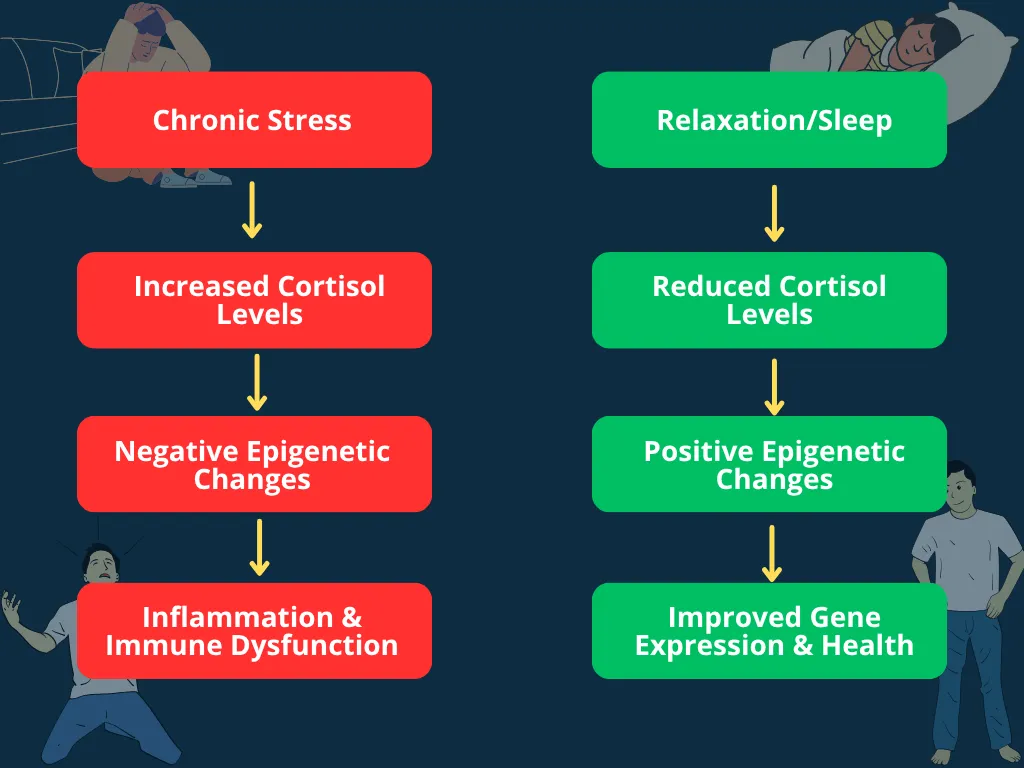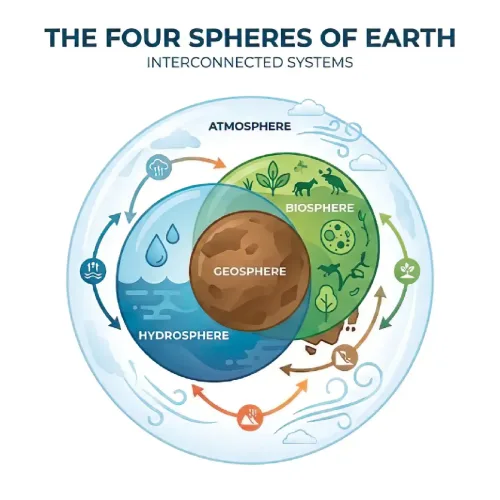A lot of us grow up thinking that our genes pretty much write the script for our lives, like whether we’ll get certain diseases, how long we’re likely to live, or even how fit we’re going to be. But guess what? Science has a different angle on this. Sure, genetics play a part, but there’s this really cool area called epigenetics that shows how much our lifestyle choices can boost our over all health.
Things like what we eat, how often we hit the gym (or don’t), our stress levels, and how well we sleep, these factors can switch our genes on or off, and that can have a huge impact on our health. Isn’t that empowering? The best part is that we have complete control over this process.
In this post, we’ll dive into how lifestyle epigenetics really works and boots health. I’ll share some practical tips to help you boost your health by optimizing how your genes express themselves, and all without needing to be a genetic expert!
What is Epigenetics and Why Does It Matter for our Health?
Epigenetics is like the software for our DNA’s hardware. Our DNA sequence stays pretty much the same, well, unless we have one of those rare mutations. But those epigenetic “marks”? They’re the real game changers. They work like little switches, deciding if a gene is buzzing away or just sitting quietly. Check out the animated GIF below; it really shows how these marks can flip genes “on” or “off.” And that switch flipping can impact a lot—everything from how our body processes food to our chances of getting certain diseases.
So, what are the key epigenetic mechanisms? Let’s dive into that!
- DNA methylation: is when methyl groups are added to DNA and this reduces or prevents access to the genes.
- Histone modification: Altering the proteins (histones) around which DNA is wrapped, affecting how easily genes can be read.
So, here’s the deal: genetic mutations? They’re pretty much set in stone. Once they happen, that’s it. But epigenetic changes? They’re a whole different ball game. These changes can flip back and forth, depending on our lifestyle choices and what’s going on around us.
What this really means for us is that if we embrace healthier habits—like eating better, working out, and managing stress—we might just boost our overall health. Plus, we could lower the chances of developing chronic diseases and even have a say in how we age.
And just to clarify things a bit more, there’s a handy table below that breaks down the differences between epigenetics and genetics. It’s worth a look!
| Epigenetics vs. Genetics | Epigenetics | Genetics |
|---|---|---|
| Permanence | Reversible | Permanent |
| Influence | Lifestyle, environment | DNA sequence |
| Mutability | Changeable | Fixed |
The Science Behind Epigenetic Control
When we talk about epigenetic control, it really boils down to two main methods: DNA methylation and histone modification. Now, DNA methylation is basically when tiny groups are added to DNA. This usually ends up making genes a bit less active because it blocks access to them. Then there’s histone modification, which is all about how tightly DNA is wrapped around proteins. This can either boost gene activity or limit it, depending on the situation.
These processes are super important because they allow cells to react to things happening outside, like changes in food availability or stress, without actually altering the DNA itself. And let’s not forget about RNA interference—it can play a role too by switching off specific genes. But honestly, that part doesn’t get as much attention in discussions about epigenetics.
Why Epigenetics is Important for Personalized Health
Epigenetics really ties our lifestyle choices to our health in a fascinating way. It gives us a solid scientific basis for creating personalized health plans. For instance, research has shown that certain foods can actually reduce inflammation by altering the way some genes function. Pretty cool, right? And it’s not just about what we eat. Regular exercise can also trigger changes that boost our metabolism and enhance our mental well-being.
Epigenetics is rewriting the rules of biology, showing us that our lifestyle choices can directly shape our health. — Dr. Steve Horvath, epigenetic researcher
How Everyday Habits Influence Our Epigene
The habits we follow every day really play a huge role in how our genes express themselves. It’s fascinating stuff! So, let’s take a closer look at the main factors involved.
1. The Power of Nutrition
Our diet really plays a crucial role in how our genes behave. There are these special nutrients, often called “epi-nutrients,” that can actually help our genes do their thing more effectively. Research has shown that munching on foods like berries, sipping green tea, or adding garlic and turmeric to our meals might help lower inflammation and boost our overall health by positively impacting our genes.
But here’s the flip side: if we’re loading up on processed foods, sugars, and unhealthy fats, we might be doing some serious damage to our genetic health. This can increase the risk of diseases like diabetes and cancer, which no one wants, right?
And just to make it easier, I’ve put together a little table below that showcases foods rich in those epi-nutrients and what they can do for us based on research. Check it out!
| Top 10 Epi-Nutrient Rich Foods | Key Nutrients | General Benefits |
|---|---|---|
| Berries | Polyphenols | Antioxidant, anti-inflammatory |
| Green Tea | Catechins | Supports metabolic health |
| Garlic | Allicin | Anti-inflammatory, heart health |
| Turmeric | Curcumin | Anti-inflammatory, antioxidant |
| Leafy Greens | Folate | Supports DNA methylation |
| Eggs | Choline | Supports DNA methylation |
| Broccoli | Sulforaphane | Anti-cancer, detoxification |
| Salmon | Vitamin B12 | Supports DNA methylation |
| Nuts | Vitamin E, Selenium | Antioxidant, DNA repair |
| Yogurt | Probiotics | Gut health, immune function |
2. Exercise & Physical Activity
Physical activity really packs a punch when it comes to our genes. It’s fascinating! Studies show that things like running, lifting weights, or even doing some yoga can actually change those little epigenetic markers in our bodies. And guess what? This can lead to better health overall. For example, it’s not just about getting fit; it’s about how exercise can positively affect our genetic expression. It’s pretty amazing how moving our bodies can lead to such profound changes.
- Cardio (e.g., running, cycling) enhances gene expression related to heart health and metabolism.
- Muscle training workouts can improve how resistant muscles are and how our metabolism functions by changing epigenetic markers.
- If you do yoga and flexibility exercises, it can lead to a decline in stress-related epigenetic marks and boost good mental health.
If you want to really boost your epigenetic health, aiming for at least 30 minutes of exercise each day is a great way to go. It doesn’t have to be anything crazy, just something consistent. So, get moving!
3. Stress, Sleep, and Serenity: Managing Your Epigenetic Switches
Long-term stress really does a number on our genes, particularly those that deal with inflammation and our immune system. It’s pretty fascinating, and a bit concerning, how stress hormones, like cortisol, can actually alter the DNA in our brains. This can potentially lead to mental health issues, which is something we definitely want to avoid. But don’t worry; there are ways to combat this! Techniques like meditation, deep breathing, or even yoga can really help counteract those gene changes caused by stress.
And let’s not forget about sleep. Seriously, getting enough shut-eye is crucial. When we don’t sleep well, it can really throw our genes for a loop, which can mess with our overall health. Good rest helps. So, get plenty of sleep. Aim for seven to nine hours. Do this every night. It’s a simple yet effective way to keep those genes in check. If you take a look at the flowchart below, it illustrates the stark contrast between the negative impact stress has on our genes and the positive effects that relaxation and sleep can bring. It’s all connected.

4. Other Environmental & Lifestyle Influencers
When we think about what affects our health, it’s easy to focus on diet, exercise, and stress. But there’s more to the story. Did you know that things like environmental toxins can really shake up your epigenome? Take BPA, for instance, which is found in a lot of plastics. It can lead to some not-so-great changes in our genetic expression, potentially raising our risk for diseases.
But having strong social ties and a supportive community can actually have a positive impact. It’s fascinating how those connections can encourage epigenetic changes that are linked to better overall well-being. So, it seems like who you surround yourself with really does matter!
Epigenetics in Disease and Longevity
Epigenetics is changing the game when it comes to how we think about health. This area of study is opening up new ways to prevent diseases and even boost our lifespan.
1. Epigenetics and Disease Prevention Strategies
Epigenetic changes have a big role in chronic diseases like cancer, diabetes, and heart disease. It’s pretty fascinating when we think about it. By making some simple lifestyle choices—like munching on foods packed with nutrients and keeping active—we could actually lower our chances of facing these health issues. Take broccoli, for instance. It’s loaded with something called sulforaphane, and studies suggest that it might even have some protective effects against cancer. So, a little change in our diet could go a long way!
2. Anti-Aging and Longevity through Epigenetic Modulation
Therefore, the “epigenetic clock” is an intriguing concept that monitors biological age by analyzing DNA methylation patterns. Pretty cool, right? And guess what? Studies have shown that by making some lifestyle changes—like eating a balanced diet full of nutrients and keeping active with regular exercise—we might actually be able to slow this clock down a bit. Who wouldn’t want that? It’s all about extending those healthy years as we age. Honestly, this whole area of research is really promising, offering a glimmer of hope for aging gracefully if we make the right choices in life.
Practical Steps: Optimizing Your Epigenetic Health Today
Ready to take control of your epigenetic health? The actionable checklist below provides practical steps to get started.
Quick Epigenetic Boosters: Simple Lifestyle Hacks
- Eat epi-nutrients daily: Add cruciferous vegetables (like broccoli), berries, or green tea to your meals.
- Move daily: Try to move for half an hour a day by walking, biking, or doing yoga for better gene expression.
- Manage stress: Take 5 minutes to focus on deep breathing or write down your thoughts to lower stress-induced genetic changes in your body.
- Prioritize sleep: Try to sleep for 7-9 hours each night to keep your epigenome healthy.
Building Long-Term Epigenetic Habits
To make these changes stick, try these behavior-change strategies:
- Habit stacking: Pair your new habits with what you already do, for example, stretch each time you brush your teeth.
- Environment design: Display fresh foods and move the snacks away from your kitchen.
- Set realistic goals: At the beginning, choose small targets by adding one vegetable to every meal.
- Find social support: Look for groups or tell your friends about your goals so they can help motivate you.
These habits can help you monitor your progress and stay consistent.
Conclusion
Our genes don’t have to decide our fate. It’s pretty fascinating how lifestyle choices can actually influence how our genes express themselves. This whole idea of lifestyle epigenetics means we have a say in our health and even how long we live.
By making smarter choices—like what we eat, how we move, how we handle stress, and of course, getting enough sleep—we can really improve our epigenetic health and lower the chances of getting sick.
So, why not kick things off with something simple today? Maybe include some berries into your breakfast or go for a quick stroll. Just one little step can lead to bigger changes down the line. We hold the keys to our own epigenetic blueprint, and every healthy decision is a leap towards a more vibrant, healthier future. Isn’t that empowering?




